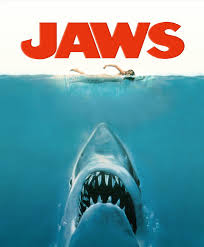
Oh, my god, this film is so fucking good. It’s impossible to overstate how excellent of a film Jaws is, and how important it was in the history of cinema. Rarely is there such a confluence of such greatness and such historical importance in a single film, and Jaws hits all the right notes. It’s ranked #48 on the original AFI list of the top 100 movies of all time, and my own personal list has it in the top 5 most important films of all time. It is not hyperbolic to consider Jaws as being at least as culturally important as Gone With the Wind, The Godfather, Star Wars, Titanic, Avatar or any other film that you’d care to mention. Jaws was the first summer blockbuster, it made Steven Spielberg’s career possible, it demonstrated how important the musical score can be to a film, and it literally made large swaths of the population afraid to swim in the ocean.
Why it’s essential.
Jaws is one of those textbook films that has all of the components working equally and at a high level. The structure of the story is perfect, the pacing of the storytelling and the action makes this one of the most entertaining films ever made, the music accentuates the mood as well as the story telling, and the acting is nothing short of superb. Am I being hyperbolic? Perhaps, but I don’t think so. Jaws is a film that works incredibly well on many levels and holds up for reasons that are ironic, and yet reasonable.
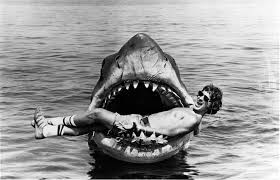
Everyone knows the story about how the mechanical shark didn’t work. I recommend seeing the documentary The Shark is Still Working, if you’ve never seen it before. One of the topics it discusses is the fact that the mechanical shark’s continued malfunctioning actually ended up helping the film in the long run because Spielberg was able to use the fear of the unknown to his advantage by not showing the shark. Indeed, the actual screen time for the shark is very low, and not being able to see it, subconsciously makes it much more frightening. The scene where the shark jumps onto the boat looks campy by today’s standards, and the film would have suffered if a the mechanical shark kept showing up and looking unrealistic. But because we see so little of it, we need to use our own imaginations to fill in the blanks, and that allows the tension and the fear factor of Jaws to hold up to this day.
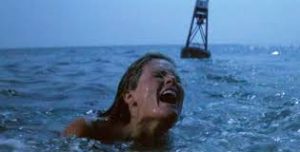
A little over a year ago I screened Jaws for about 25 people, about half of whom had never seen it. I know it’s hard to believe, but there are quite a few people out there who have never seen Jaws. It was great for me, because I’d seen the film so many times, and I can’t recall the previous time that I would have seen it with someone who hadn’t seen it before. Well, I can tell you that the horror holds up, because there are screams and squeals at all of the appropriate times, and people were genuinely affected by the film when it was over. Right from the inciting incident when Chrissie Watkins becomes the shark’s first victim less than five minutes into the film, and all the way through the end, the adventure and the horror and the drama mix together to create an entertaining and powerful film.
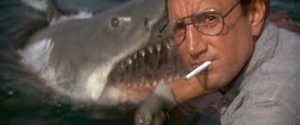
From a screenwriting standpoint, Jaws is a film that aspiring screenwriters should study. It has an excellent structure and a complete Hero’s Journey. In fact, there are individual scenes and sequences that have perfect 3-Act structure and Hero’s Journeys contained within them, one of which I blogged about here last year. The hero of the film is Chief Martin Brody (Roy Scheider), a New York City native who has transplanted himself to Amity Island, a Cape Cod-like resort community that relies on summer tourism for its very survival. Chief Brody’s Ordinary World is as the police chief of this small town. His Call to Adventure is the discovery of Chrissie Watkins’ remains and the Refusal of the Call is when he’s told that her death was the result of a boat accident and there’s no need for the beaches to be closed. Brody Crosses the First Threshold when young Alex Kintner is killed by the shark in front of several people and now there’s no mistaking that they have a shark problem that needs to be dealt with.
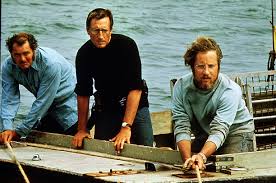
The Meeting of the Mentor usually happens in the first Act, but it’s in the second act in Jaws, and it’s the introduction of Quint (Robert Shaw), a local fisherman who offers to kill the shark for $10,000, much more than the $3,000 bounty that Mrs. Kintner is offering. The Tests, Allies and Enemies portion of the script introduces us to Matt Hooper, Richard Dreyfuss), and shows the various tests that Brody and Hooper go through find out what kind of Shark they’re dealing with. That is the crux of Act IIA. The Approach is the scene in which Brody and Hooper try to convince Mayor Vaughn (Murray Hamilton) that the shark is a Great White and that needs to be dealt with. The Supreme Ordeal is the scene that I linked to, and it has the shark actually attack the island and Brody’s family is directly impacted. That moves us into Act IIB, and the Reward stage of the Hero’s Journey in which Brody finally has the support of Mayor Vaughn to close the beaches and get Quint to help him kill the shark, which is the crux of Act IIB.
By the time we get to The Road Back portion of the story, we enter Act III, and the Shark has seemingly won. Quint’s boat is practically destroyed and the shark has proven to be seemingly indestructible. Act III becomes about survival in the Resurrection stage as the three men, who had been rivals, now must work together to defeat a common enemy. Brody finally kills the shark after the shark had killed Quint, and the Return with the Elixir shows that Hooper and Brody survived, and can return to the island safely.
What the storyline has in its premise is the basis of terrific drama. This small community relies on summer tourism in order to survive. I grew up on Cape Cod, so I know what that is like. In the film, a shark threatens that tourism business, and that forces the people in the story to act. They can’t just stay out of the water until the shark goes away. They have to be proactive and take care of their own problems for the sake of their economic survival. That is the basis of great drama.
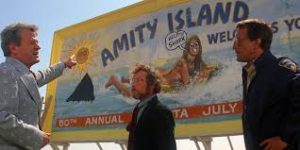
What’s more is that the hero has to confront his greatest fear in order to do so. Chief Brody is afraid of the ocean and afraid to go on boats. But in order to kill the shark, he must confront both of those fears. Quint also goes through a great character arc. He starts the story out as cocky and arrogant, but the shark humbles him by the end, though it’s unfortunately too late for him. But the change in Quint is great because it’s subtle and happens organically within the confines of the story. It isn’t contrived to fit into the narrative. The narrative allows it to happen.
Finally, there is the music. The theme to Jaws is one of the most recognizable movie themes in the history of cinema, and Spielberg used it expertly to help craft the narrative. The music cues do more in this film to tell us when to be scared, when to be excited, then most films do.
Basically Jaws is a badass film. I’m sure there are many people out there who haven’t seen it, and if you’re one of those, it should go to the top of your list of films to see. It’s one of the most complete films that I’ve ever seen, it’s definitely in Spielberg’s top 3 of all of the films that he’s ever made, and it’s quite frankly one of the most entertaining and seminal films of all time.